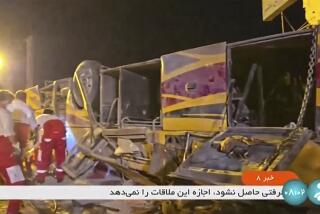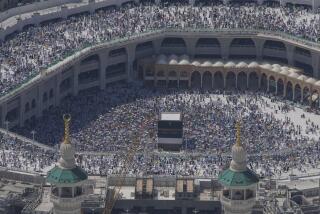Saudi Arabia accused of neglect over deadly disaster at hajj
- Share via
MINA, Saudi Arabia — Saudi Arabia faced new accusations of neglect Friday in the hajj disaster that killed over 700 people, the second tragedy at this year’s pilgrimage overseen by the kingdom’s rulers who base their legitimacy in part on protecting Islam’s holiest sites.
Leading the criticism was regional Shiite powerhouse Iran, which always seeks an opportunity to undermine its Sunni adversary.
Iranian President Hassan Rouhani said in New York that at least 140 Iranians were killed. He suggested that “ineptitude” by the Saudi authorities involved in organizing the hajj was to blame for the two accidents this month that have resulted in at least 830 deaths.
In Tehran, the Iranian Foreign Ministry summoned a Saudi envoy for the second time in as many days to hear protests over the incident, a vice president blamed Saudi “mismanagement,” and thousands marched in the streets and denounced the Saudi royal family.
Saudi Arabia has spent billions of dollars and undertaken massive construction projects to make the annual hajj safer for the world’s Muslims, and the last serious loss of life had occurred nine years ago.
In the worst hajj disaster in a quarter century, two huge waves of pilgrims converged Thursday on a street near a religious site in Mina, and 719 people were crushed or trampled to death, while 863 were injured. That followed an accident Sept. 11 in which a storm toppled a crane at the Grand Mosque in Mecca that killed 111 people.
While Saudi authorities are still investigating Thursday’s accident, Health Minister Khalid al-Falih has blamed it on the masses themselves, telling a Saudi broadcaster that “some pilgrims had moved in the wrong direction amid the crowds.”
But a survivor who spoke to The Associated Press said some Saudi guards only exacerbated the stampede at Mina by refusing to open nearby gates that could have relieved the crush.
The street where the incident took place is about 12 meters (36 feet) wide and lined with barricades, behind which are tents of hajj tour groups. Pilgrims move in one direction to and from a religious complex, where they throw stones at pillars representing the devil. On Thursday, the crowds apparently collided with each other at an intersection, the Interior Ministry said.
Survivor Mahfouz el-Taweel of Egypt told the AP he was in the crowd packed shoulder to shoulder that collided on the same street with another mass of people coming from a different direction. Those in the back were unaware of this and pressed forward, causing a crush of bodies, trampling and a stampede, the 52-year-old el-Taweel said.
“If they had barred people from coming the other way, this would not have happened,” he said.
“I’m coming to perform the hajj, not to die,” el-Taweel added. “These people deserve compensation. It’s not just enough to say God’s will and call them martyrs.”
He said Saudi Arabia should share responsibility for the hajj with a multinational force from some of the countries that send large numbers of pilgrims, such as Egypt.
About 2 million pilgrims from more than 180 countries took part in this year’s hajj, which ends Saturday.
Pakistan said eight of its pilgrims were killed in the accident, but 150 were still missing. Reports said at least 30 people were killed from Mali, 14 each from Egypt and India, five from Senegal, four from Turkey, and three each from Indonesia and Kenya.
The deaths of the Iranians ignited long-simmering anger Iran holds for Saudi Arabia over the authority the kingdom exerts over the hajj, especially after allegations in April that Saudi airport officials abused two male pilgrims from Iran.
Although hundreds of thousands of Iranians make religious trips to Saudi Arabia each year, Iran for a time stopped sending pilgrims. That came after Saudi security forces killed more than 400 people, mostly Iranians, in a 1987 clash sparked by protesting Iranian pilgrims.
Saudi Arabia fears the growth of Iranian political influence in the Middle East on the back of the Islamic Republic’s nuclear deal with world powers. In Yemen’s civil war, a Saudi-led, U.S.-backed coalition supporting the country’s exiled president is bombing Shiite rebels there with links to Iran.
Hours after the hajj disaster, Iran’s Supreme Leader Ayatollah Ali Khamenei urged Saudi authorities to accept responsibility for the tragedy, saying it was caused by “mismanagement.” Iranian state-run media and government officials repeated that allegation Friday.
Rouhani, who is in New York for the U.N. General Assembly, told a group of editors that both accidents suggested “ineptitude” on the part of Saudi authorities. He speculated that more experienced military officials had been diverted to Saudi Arabia’s military intervention in Yemen, leaving less-experienced personnel in charge of the organizing the hajj.
“These incidents, they do not conform to the normal parameters” of religious pilgrimages or rites, Rouhani said, and the authorities could be viewed as “not sufficiently responsible to be hosting” such large groups of people.
“We do not accept and have completely opposed” Saudi policy in Yemen, he said, rejecting Saudi Arabia’s right to “interfere in Yemen’s internal conflict.” However he said Iran would not hesitate to engage in dialogue with Saudi Arabia “if we see a framework” for such discussions.
Iran’s Cabinet held an emergency meeting, and First Vice President Ishaq Jahangiri said it was clear “the Saudi government is responsible for this disaster ... and has to provide answers.” He added that “mismanagement is definitely the cause” of the tragedy.
Thousands of demonstrators in Tehran chanted, “Death to the al-Saud family,” and Iranian state TV showed similar protests in other Iranian cities.
Ayatollah Mohammad Emami Kashani, a senior cleric in Tehran, called for the Organization of Islamic Cooperation, the world’s largest body of Muslim nations, to take over administering the hajj.
“The Saudi government and authorities involved in hajj should appear before court and be held accountable,” Kashani said. “They should not lie and say, ‘It was because this or that, the weather was hot, it was the pilgrims’ faults.’”
Saudi King Salman, who is overseeing his first hajj as ruler, holds the title of “custodian of the two holy mosques,” which gives the monarchy great religious clout and prestige.
Iyad Madani, the secretary-general of the 57-nation OIC, backed Saudi Arabia. He previously served as the kingdom’s hajj minister.
Madani “expressed hope that no party would seek to take advantage of the pilgrimage and pilgrims, and the incidents that might happen when these crowds of millions perform the same rituals at the same time, in a controversial context that would divide rather than unite,” he said in a statement.
Hassan Nasrallah, leader of Lebanon’s Iranian-backed Hezbollah group, said the Saudi government bears the responsibility for the accident and called for those countries that lost many victims to join the investigation to ensure there is no cover-up.
___
Gambrell reported from Dubai, United Arab Emirates. Associated Press writers Ali Akbar Dareini in Tehran, Iran, John Daniszewski in New York, Sarah El Deeb in Beirut, Zarar Khan in Islamabad, and Omar Akour in Mecca, Saudi Arabia, contributed to this report.
___
Follow Aya Batrawy on Twitter at www.twitter.com/ayaelb .
Follow Jon Gambrell on Twitter at www.twitter.com/jongambrellap.
Copyright 2015 The Associated Press. All rights reserved. This material may not be published, broadcast, rewritten or redistributed.
More to Read
Sign up for Essential California
The most important California stories and recommendations in your inbox every morning.
You may occasionally receive promotional content from the Los Angeles Times.










